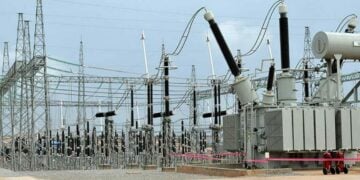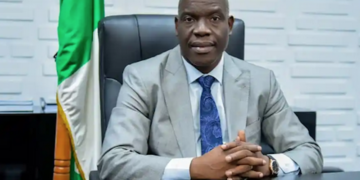In a more aggressive twist to rein in inflation, the Monetary Policy Committee of the Central Bank of Nigeria (CBN) yesterday announced a two-pronged approach to effectively mop liquidity out of the vaults of the nation’s deposit money banks.
This is as analysts say the latest hike in rates by the MPC will only have a mild effect on inflation as the rising interest rate will further dampen growth of the economy.
MPC increased the Monetary Policy Rate (MPR) by 150 basis points and the Cash Reserve Ratio (CRR) by a minimum of 32.5 percent. What that means is that the MPC raised the MPR to 15.5 percent, increased the CRR to a minimum of 32.5 percent, retained the asymmetric corridor of +100/-700 basis points around the MPR, and retained the Liquidity Ratio at 30.0 percent.
CBN Governor Godwin Emefiele said the commercial banks are now required to fund their accounts with the apex bank between today and tomorrow to enable the CBN meet the new liquid asset requirement or face severe sanctions that include disqualification from foreign exchange market.
“We have increased the CRR, and we expect that this decision at this meeting must be seen to be potent. It must achieve the effect that the MPC thinks it should achieve. What it means is that we expect that all the banks in Nigeria must fund their accounts by Thursday (48 hours) because we will debit them for CRR. We will take their CRR to a minimum of 32.5 percent. Which means we are going to take liquidity out of their vaults by Thursday.
“If any bank fails to meet up with this expectation, the decision of the MPC is that we may need to preclude those banks from foreign exchange market on Friday and onward until they meet this 32.5 percent,” Emefiele said yesterday during a press briefing on the outcome of the September edition of MPC meeting in Abuja.
The message is meant to underscore the fact that MPC feels the very aggressive decision to rein in inflation must yield results. The CBN is making that effort to avoid public dissent for not being able to rein in inflation in spite of all the rates it has raised.
About all the MPC members agreed that a tight policy stance would help consolidate the impact of the last two policy rate hikes, which is already reflecting in the slowing growth rate of money supply in the economy. The option to loosen the policy rate was not considered, according to the communique that was read. The reason is that it would be gravely detrimental to reining-in inflation.
Emefiele said policy tightening was the best option at the current situation of inflationary pressure, even though he acknowledged the fact that it will retard growth and increase cost of borrowing. Within a four-month period, Nigeria’s inflation had accelerated aggressively by 280 basis points from 17.71 per cent in May 2022 to 20.52 per cent in August 2022.
“Yes, it will retard growth. But it is important, you know, that the level of rate is what will help you to slow down the rate of inflation. Raise rate or not, what will happen is that consumption and investment will be affected because the purchasing power of the consumer will derail or completely dissipate. You don’t have a choice but to raise rates,” the CBN governor said.
…Spends N9trn on interventions programmes in 3 years
Meanwhile, the MPC also disclosed that in the last three years, the CBN has injected over N9 trillion into the economy, in addition to offering a two-year moratorium for 10-year long-term loan facilities. The committee believes that the interventions have significantly helped engendered growth.
However, in light of the persisting pressures on inflation, the committee encouraged the apex bank to maintain a close watch on the inflationary implications of the interventions.
…Appeals to foreign countries to allow Nigerian airlines land in their shores
The CBN governor has appealed to foreign nations to allow Nigeria-based airlines to land their aircraft in their countries.
Fielding questions from journalists, Emefiele said Nigerian airlines must be given a chance to land an equal number of planes in other countries per week in line with the bilateral air services agreement.
“That’s what we are begging for,” he said.
There are reports that some Nigerian airlines were denied the opportunity to land their aircraft in some countries. Emefiele thinks that Nigerians must rise to demand the right for Nigerian airlines
Emegfiele said the CBN is determined to clear the backlog of trapped aviation funds in Nigeria. He said the CBN will continue to make the releases to make sure that the cumulative backlog is cleared.
He told the foreign airlines that there is no law that makes it compulsory for the foreign airlines to buy dollars from the central bank. Emefiele asked the foreign airlines to approach their banks to always buy dollars from legitimate or approved sources, in this case, the I&E to buy dollars and pay for their ticket sales.
“If they don’t find, they will resort to the CBN. But it does not mean that the CBN is under compulsion to provide your dollar,” he stated.
He appealed to the countries where the foreign airlines are domiciled or where their flights originate to also give Nigerian airlines the chance to land their aircraft in their countries also in line with the bilateral air services agreement.
“You cannot be having 21 landing slots in a week from your country into Nigeria and yet you have not given a Nigerian airline the opportunity to land its airlines in your country even up to seven landings. To us, as Nigerians, this is unacceptable, and Nigerians must stand and criticise this that it is not acceptable,” he argued.
“When you give Nigerian airlines an opportunity to land in your country, people who travel with these airlines pay naira. If they pay naira, they will not come to the central bank or any bank to say they want to remit ticket sales. I have to be selfish to defend my country. The only thing they will go to their bank or the CBN to say they need will be dollars to import planes or dollars to import spares or pay for their insurance, which is lower than if they were to remit the entire ticket sales,” Emefiele added.
MPR Hike Will Reduce Banking System Liquidity — Analysts
Head of Financial Institutions Ratings at Agusto & Co, Ayokunle Olubunmi, speaking on the impact of the decision on the market, noted that the immediate effect will be a spike in the interbank rates.
As of Monday, overnight NIBOR was 15.05 per cent with the one- and three-month rates closing at 10.58 and 13.69 per cents respectively.
Ayokunle noted that as banks borrow from each other to close their positions, the lowered liquidity due to the CRR hike will cause the rate at which they borrow amongst themselves to rise significantly.
Asides this, he said in the long run, lending rates in the banking industry are expected to rise to over 40 per cent as banks strive to make the most of the little liquidity that they have to lend out.
This was corroborated by analysts at Parthian Securities who noted that the hawkish stance and determination of the CBN to mop up liquidity from the system will have both negative and positive impacts on bank customers.
The analysts noted that the bank customer will, in the coming days, have to deal with higher borrowing cost due to the pass-through effect of higher interest rates.
“On the other hand, bank customers might see higher savings rate in the bank,” an analyst said.
On their part, analysts at CardinalStone Securities Limited said MPC adopted a two-pronged approach to contain inflation, adding that the decision took the policy parameters to multi-year highs and underscored the CBN’s growing concern about the surging domestic inflation.
CardinalStone said, “In particular, the CBN directly moved to reduce banking system liquidity and, in the process, tried to forestall the impact of speculative dollar demand activities on inflation.
“The decision of the MPC may have also reflected the confidence boost from a seventh consecutive growth in GDP, linked with intervention efforts of both the CBN and the federal government. The desire to improve carry trade and worries over the impact of a potential surge in spending as election activities intensify may have also justified the decision.”
The analysts emphasised that a status quo decision may have led to a sustained deterioration in real returns to domestic fixed-income investors due to accelerating inflation, adding that this development would also weaken the appeal of naira assets and negatively impact the currency.
Similarly, analysts at Cordros Securities Limited said the CBN decision to raise the CRR to a minimum of 32.5 per cent came as a surprise.
“That said, we believe the decision of the MPC was supported by the Q2, 2022 GDP number, which provided a cautious comfort on growth levels and provided the needed impetus for the Committee to maintain its fight against the stubbornly-high inflationary pressures, more so that a sustained negative real interest rate could dampen domestic investments and undermine the stability of the local currency.
“As we have previously highlighted, considering that short-term inflation expectations are biased to the upside due to elevated energy prices, high global food prices exacerbated by the Russia/Ukraine conflict, and spending associated with the build-up of election activities, we think the action of the Committee to raise the MPR by 150bps seems justified. Moreover, the more hawkish rendition among global central banks also supports the Committee towing the same path to reduce external pressures.”
They added that “on the domestic front, consumer price pressures are expected to linger while we expect domestic growth to remain intact in the near term. Accordingly, we expect the Committee to march on with its monetary policy tightening in the short term to tame inflation expectations, narrow the negative real interest rate gap and reduce external pressures.”
On the fixed income market, Cordros Securities said: “We see scope for a continued uptick in FI yields as tightening global financing conditions will compel the government to increase reliance on the domestic market to finance the budget deficit.
“On the equities market, we expect the local bourse to maintain cautious trading sentiments as electioneering activities kick off in full gear.”





